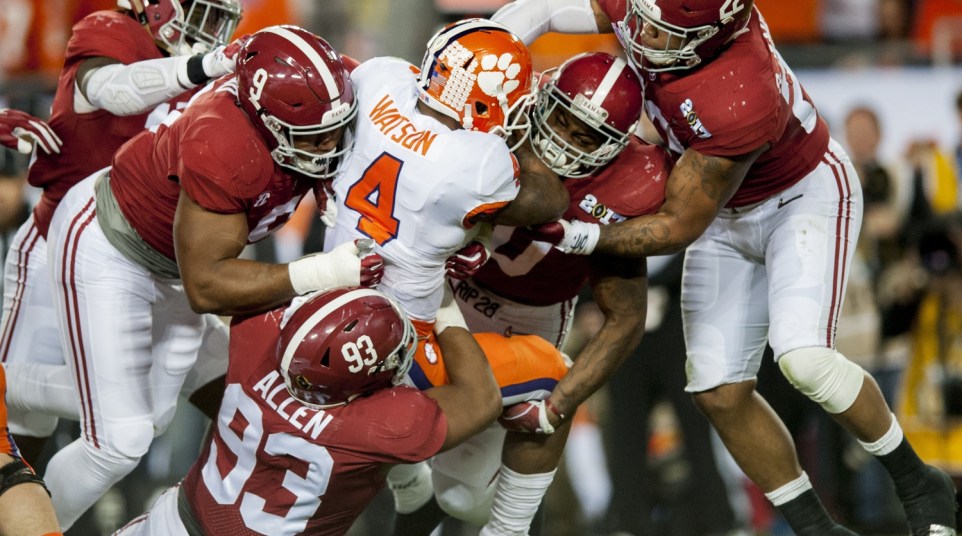
Should you feel better or worse about your defense in 2017?
Defense, it is often said, wins championships. In the SEC last year, it was no different. Alabama had the best defense and the Tide rolled to the conference title.
But what about the 2017 season? It’s never too early to look ahead to see who should feel excited about it and who should view next football season with trepidation.
As a whole, the SEC allowed far more points in 2016 than the previous season. That trend will have to be reversed if the conference hopes to continue to hang onto the banner as the best in the nation.
However, LSU did not contribute to that slide. In fact, the Tigers made an SEC-best 8.5 points per game improvement over a 2015 season in which they yielded 24.3 points per contest. SEC West brethren Auburn improved dramatically as well.
On the other side of the coin, Missouri nearly doubled its points allowed from the 2015 season (16.2 to 31.5), and Ole Miss gave up a ton of points as well, most in the conference, in fact, in per-game average.
Georgia and Tennessee slipped a bit over the 2015 numbers but still managed to have decent seasons, albeit below expectations where the Vols were concerned, and Mississippi State joined in the slump defensively.
So what can we expect in 2017? Here’s a look at which teams will be better and which will be worse next season, with the points each allowed per game in 2016.
Better
Arkansas (31.1) – The Razorbacks are better than what their defense portrayed last season. New DC Paul Rhoads will need to fill in a few key gaps, especially along the line, but look for the Razorbacks defense to be much improved in 2017.
Auburn (17.1) – Tigers DC Kevin Steele was outstanding in his first season with the program, and although replacing sack artists DE Carl Lawson and DT Montravius Adams is an impossible task, it appears the Auburn defense is in good hands.
Georgia (24.0) – The Bulldogs return a defense nearly intact for DC Mel Tucker. That alone should make the Bulldogs an even better defensive unit than in 2016, which wasn’t bad at all. Georgia ranked fifth in the SEC in points allowed per game.
Mississippi State (31.8) – It’s no secret that the Bulldogs have to tighten up on defense next season. That’s where new DC Todd Grantham comes into play. He led a Louisville defense last season that allowed 23.8 points per contest.
Missouri (31.5) – The Tigers are hopeful of returning to the kind of defense they played in 2015, giving up just 16.2 points per game. It won’t be easy, losing DE Charles Harris, but historically they’ve been much better than the 2016 defense that allowed the most points per game since joining the SEC.
Ole Miss (34.0) – There’s nowhere to go but up for the once proud “Land Shark” defense, last in the SEC in points allowed for the 2016 season. Former Auburn assistant Wesley McGriff is the new defensive coordinator and has some returning talent to work with.
South Carolina (26.5) – With defensive-minded head coach Will Muschamp and DC Travaris Robinson, the Gamecocks should continue to improve after finishing last in the SEC in 2015 in average points allowed.
Tennessee (28.8) – One would have to imagine that the Vols won’t be as unfortunate in the injury department next season as they were in 2016. Still, DC Bob Shoop must replace a pair of ends and corners as the Vols look forward to a healthier 2017.
Texas A&M (24.5) – The Aggies took a step back in 2016 under DC John Chavis. That has to be a fluke, although he’ll have to find a way to make up for the departure of standout DEs Myles Garrett and Daeshon Hall. A seasoned secondary could provide some answers.
Worse
Alabama (13.0) – Before you go racing for the comment section, know this: although the Alabama defense is going to be worse (how could it not be?), it will still be the best in the conference, if not the nation. That’s what years of top recruiting classes will do for you.
Florida (16.8) – The Gators lose a ton of talent and will break in new DC Randy Shannon on somewhat of a rebuilding project. The schedule doesn’t help, either, with games against Michigan, LSU, Florida State and Tennessee.
Kentucky (31.3) – The Wildcats haven’t exactly been the prototypical defensive juggernauts in recent years. Don’t look for that to change in 2017, although the secondary should stand out again.
LSU (15.8) – The Tigers lose an incredible amount of talent after an outstanding effort in the first year under DC Dave Aranda. He’ll earn his keep in 2017 as he plugs in younger talent to fill the many holes.
Vanderbilt (24.0) – The Commodores have been up and down defensively over the last several years. Replacing a talent like LB Zach Cunningham won’t be easy and could point toward a down year in 2017 after a very impressive 2016.
